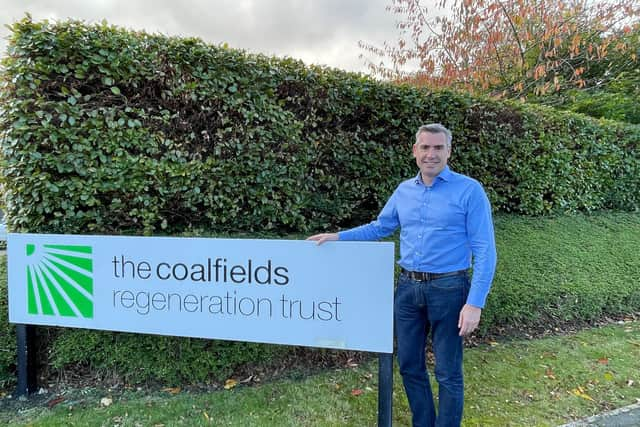How the Coalfields Regeneration Trust is helping to create jobs in Yorkshire's former mining towns
Coalfield Regeneration Trust (CRT) Property Investments, a wholly owned subsidiary of the Trust, is developing a £3.4m industrial business park for small-and-medium-sized businesses on the former site of Kellingley Colliery in West Yorkshire.
It will offer 11 units that range from 3,000 sq ft to 4,000 sq ft.
Advertisement
Hide AdAdvertisement
Hide AdSpeaking to The Yorkshire Post, Shaun O’Brien, property investment and development director, said the aspiration was to complete 100,000 sq ft a year across three sites.


“Covid has set us back and hasn’t allowed us to do that over the last few years but from 2022 we will start that process,” he said.
CRT is different to most property developers. It is a not-for-profit organisation working in former mining towns across England, Scotland and Wales.
When British coal mining was at its peak in the early 1900s, it was one of the UK’s most important industries and employed nearly 1.2 million people.
Advertisement
Hide AdAdvertisement
Hide AdAs the industry contracted and large numbers of pits closed, it had a devastating impact on the communities that once relied on them for jobs, housing and social support.
By the late 1990s, former coalfield areas had a lack of employment opportunities, experienced high levels of poor health and many people had no or few qualifications.
In 1999, The Coalfields Regeneration Trust was established as an independent charity with a focus to support the communities and create opportunities for their people.
It reinvests its profits back into local communities through outreach programmes.
Advertisement
Hide AdAdvertisement
Hide AdSchemes include employment and skills coaches working with local communities on a one-to-one basis and also using sports as a way of moving young people off the streets at night.
“Not all returns are financial in our business,” Mr O’Brien said. “We class the social returns as being as important as the financial returns.”
CRT Property Investments is about to submit a planning application to develop 45,000 sq ft of industrial property on land in Abervale in Wales. It also has smaller schemes planned for Rotherham and Mansfield in 2022 and 2023.
The developments, according to Mr O’Brien, are ‘very good quality’. “To some people, the places we build in are secondary and tertiary but there are lots of reasons why that would be a prime area for businesses, for example better infrastructure or public transport,” he said.
Advertisement
Hide AdAdvertisement
Hide Ad“Communities on former coalfields deserve good quality accommodation. It costs us a little bit more money to build nicer sheds but we want to create something that’s aspirational.”
Funding is the key to getting the developments off the ground. Until 2015, CRT received £15m-£20m a year from the Government in England. Now it has to fund its own projects.
Until now it has been able to tap into the European Regional Development Fund. Since Brexit, it has has the onerous task of keeping track of lots of smaller pots of money around the UK, available through the Government’s Levelling Up Fund, Towns Fund deals, and The UK Shared Prosperity Fund.
“There’s a considerable amount of funding coming forward, it’s just a question of how does our organisation access that funding,” said Mr O’Brien.
Advertisement
Hide AdAdvertisement
Hide AdHe added: “We’re constantly engaged with government and we would dearly love to create a fund that is dedicated to coalfield communities in the same way that coastal communities have had a dedicated fund to them.
“The outputs that come from our developments are substantial: regenerating brownfield land, creating floor space, creating jobs. It’s a positive impact on local communities that need investment.
“If we can get funding it means we can match our own money with that funding and deliver twice as many developments. If the funding isn’t there, we still deliver but we only deliver half as much or the same amount in twice as long.”
Comment Guidelines
National World encourages reader discussion on our stories. User feedback, insights and back-and-forth exchanges add a rich layer of context to reporting. Please review our Community Guidelines before commenting.
